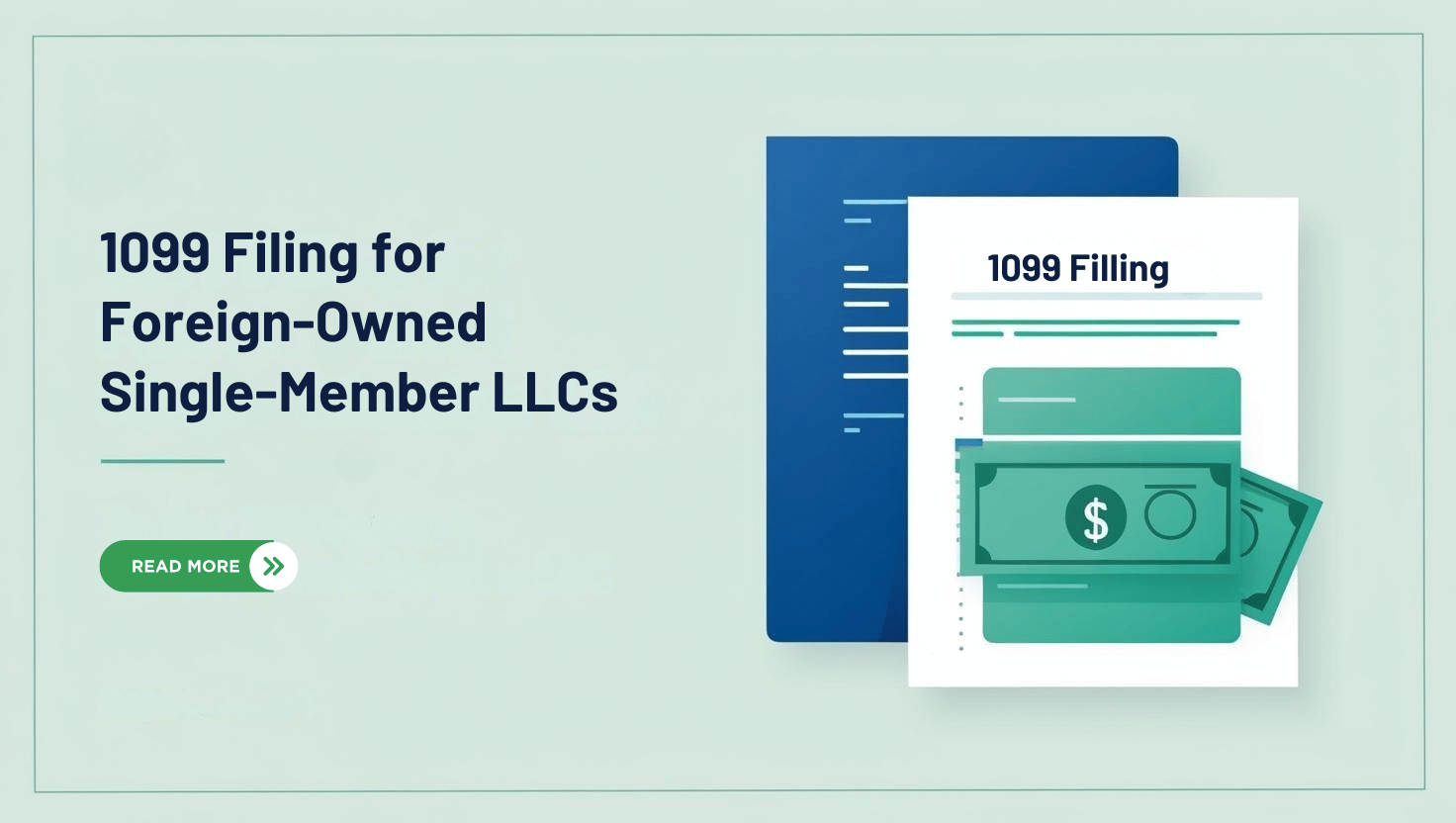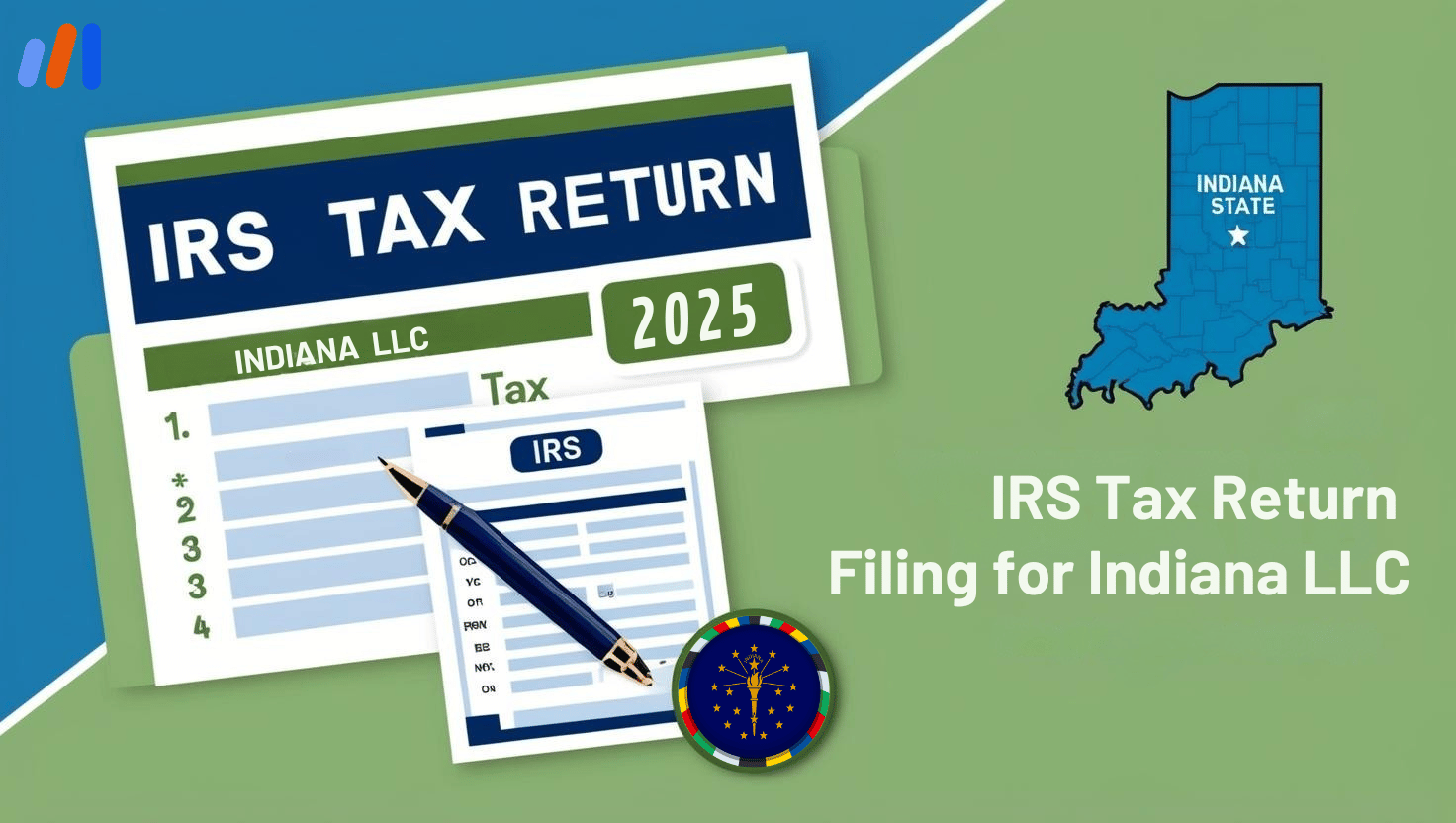For someone new to US tax regulations, understanding how to file Form 1099 for a foreign LLC owned by a single member can be challenging.
Filing Form 1099 alongside taxes can be convoluted, and should not be taken lightly as it puts you at risk of penalization under IRS rules and regulations. In this guide, we will cover everything that entails making sure you are compliant with IRS whether it has to do with filling out forms or filing taxes yearly.
What is a Single-Member LLC?
Single-member limited liability company is an amalgamation of proprietorships and corporations that have only one owner. Because of its ease of use and the fact that the owner is shielded from personal liability, it is widely used in the United States. Because there is no mistreatment of profits, this type of structure is also commonly used by business owners.
How Does Foreign Ownership Impact an LLC?
When a Single-Member LLC is owned by an individual/organization with foreign citizenship then it is recognized as Foreign Owned Single Member LLC, and such entities are required to adhere to mandatory reporting procedures and compliance requirements which are found in the US tax laws.
Unless a Limited Liability Company (LLC) chooses to be regarded as a corporation, it is automatically considered to be a blank entity. Essentially, if an LLC does not elect taxation as a corporation, it will be treated simply as an individual with its income and losses reported on its tax return as due.
What is a Form 1099?
Form 1099 is an information return submitted to the IRS for income not included in someone’s W2. Receiving this form means, for example, that a business paid a company over a certain amount for freelancers, vendors, or contractors’ services during that tax year.
Types of Form 1099:
Form 1099 Miscellaneous: Rents, royalties, and other forms of income would be reported under Form 1099 Miscellaneous if the income exceeds $600 in a year.
Form 1099-NEC: Established in the year 2020, this form is used for reporting non-employee compensation. This includes payments made more than $600 for independent contractors during a particular tax year.
Filing Requirements
A foreign-owned single-member LLC is generally considered to be a disregarded entity. In other words, for US tax purposes, the single-member owner of the foreign entity is treated as a person, not a firm. Here, the LLC’s income is consolidated into the appropriate owner’s return form (1040) as long as the owner has a US tax requirement.
Key Filing Requirements:
Disregarded Entity Status: Single-member LLCs that are owned by foreigners are considered to be or have elected to be considered by an LLC, as disregarded entities, meaning that they have no recognizable structure. Income and expenses are reported directly by the owner, therefore simplifying the entity’s tax filings.
No Need to Pay in Foreign Currencies: Payments made to foreign contractors or vendors were not required to file any Form 1099 with the IRS and are therefore exempt from the form’s requirements since these payments made outside the United States are not subject to their regulations.
Payments to US Contractors: For example, if your LLC pays contractors or vendors in the US greater than $600 in value, you will also be required to submit a Form 1099. To fill this form, you are obliged to obtain from the payee the completed W-9 form which contains their Taxpayer Identification Number (TIN).
Withholding Taxes
Withholding tax is another form of tax obligation that may be brought to your attention when dealing with foreign contractors or payments.
US Services
- If your LLC engages foreign contractors for services in the US, you might have the obligation to also withhold US tax from such payments. The typical rate of withholding is 30% unless the rate is lowered due to the existence of a tax treaty.
No Withholding Outside the US:
- For services rendered outside the US, there is no tax withholding, and there is no need to file a Form 1099. However, it is crucial to have documentation on the services to be rendered for the service to be excludable from filing.
W-8 Forms:
- Are you looking to shield yourself from backup withholding as well as prevent your foreign contractors from identifying your status as a resident? In such a case, you are required to obtain valid W-8 forms such as the W-8BEN or the W-8BEN-E. It’s important to note that these forms serve as evidence of your contractor being a non-U.S. company or individual.
Steps to File 1099 for a Foreign-Owned Single-Member LLC
Collecting the essential information:
To file the Form 1099, one is required to provide the following information to the payers:
- Payee’s name together with their address.
- If non–U.S. independent pay for any job or company, they will be required to provide a taxpayer identification number in an envelope W-9.
- Details related to payment including: Amounts Paid and the Purpose of Payments Made.
- In the case of foreign contractors, you should ensure to submit W-8 forms as proof of their identity and citizenship to evade any unnecessary withholding
Having accurate and well-documented information is crucial if one wishes to remain compliant with the laws and avoid any penalties.
Filing Through the IRS e-File System:
After collecting all of the required information,
- To not lose out on IRS e-Services you need to sign up for an account if you do not have one.
- Filing Information Returns Electronically lets you submit your Form 1099 directly.
- Make sure you file your forms before the 31st of January if you do not wish to receive a penalty for late filing.
- Lastly, try to give copies of Form 1099 to the payees by the same given deadline.
Even so, there are also external filing services or software that can assist you in the process. These sites usually also contain tools to assist you in Form 1099’s submission and even setting it up.
Key Takeaways
- Form 1099 filings become necessary only for U.S.-based entities or individuals receiving over $600 in payments.
- According to Form 1099 filing guidelines, payments to foreign contractors for services provided outside of the United States need not be filed.
- To avoid penalties or incorrect reporting, it is necessary to collect accurate W-9 or W-8 forms.
- January 31st of each year marks the due date for submitting Form 1099. Late filing penalties apply if you fail to submit it by the scheduled date. Depending on how late it is submitted, these can range from $50 to $290.
- The use of Form 1099 and withholding taxes from payments to foreign contractors are not necessary because the W-8 forms are completed.
Conclusion
The application of Form 1099 when filing single-member foreign-owned LLCs can be somewhat complicated which is where IRS rules and tax conditions need to be considered. By understanding the Form 1099 application requirements, documentation requirements, and deadlines you can prevent ineffective spending and compliance.
Don’t hesitate to contact EasyFiling if you need assistance with your 1099 documents. We specialize in streamlining the e-filing system while guaranteeing compliance and accuracy at every phase. Contact us today!
File Your LLC Today
25$ off with a coupon
Lock in EasyFiling's transparent rates and get lifetime compliance support at no extra cost.
Get Started Now







